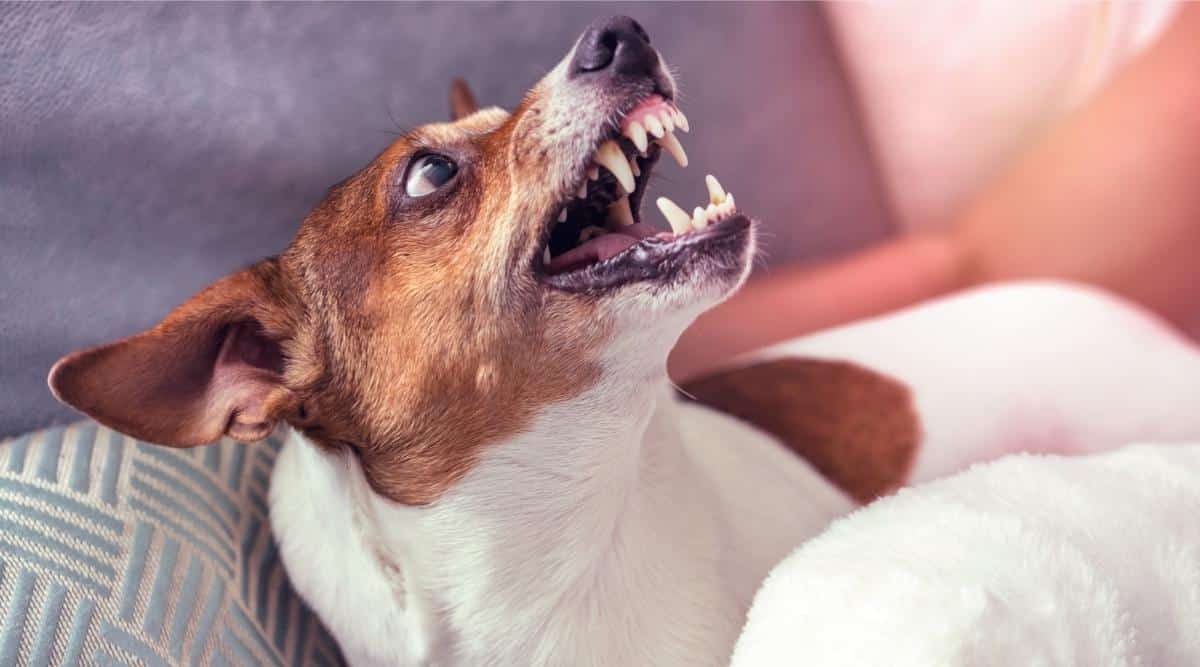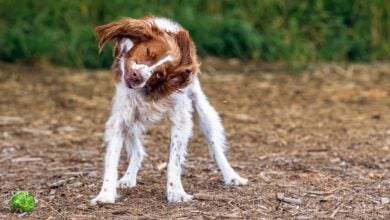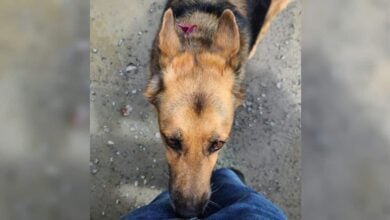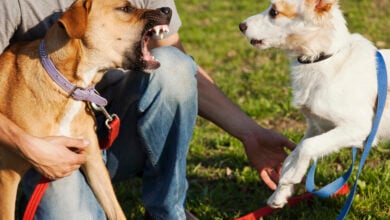Dog Sneezing Like Crazy? 8 Reasons Behind That Achoo Attack
When you purchase through links on our site, we may earn a commission. Here’s how it works.
Your dog won’t stop sneezing, and it’s starting to feel a little… excessive.
Table of Contents
It might be allergies. It might be excitement. Here are the most common reasons dogs sneeze and how to tell when it’s time to call the vet.
8 Reasons Your Dog Might Be Sneezing
Sneezing might seem simple, but for dogs, it can mean a lot of things. From harmless playtime snorts to signs of infection or irritation, decoding the cause starts with paying attention to the details.
Below are the most common reasons your dog might be sneezing, and how to tell which ones matter.
1. Play Sneezing
You toss your dog’s favorite toy, and the next thing you hear isn’t a bark, it’s a sneeze. Then another. And maybe a tail wag for good measure.
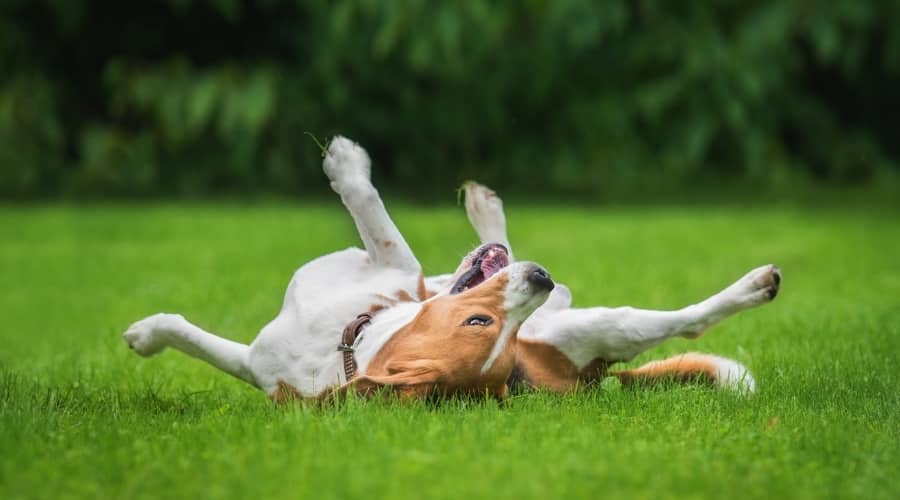
This isn’t allergies or illness. It’s play sneezing, and it’s surprisingly common in happy, social pups.
Dogs use sneezes as part of their body language, especially when play gets a little rowdy. It’s their way of saying, “Hey, I’m just goofing around.”
This behavior is more common in:
- Small and expressive breeds, like Chihuahuas or Papillons
- Playful, high-energy dogs, like Boxers, French Bulldogs, and Terriers
- Puppies still learning social cues
You might see these sneezes during a game of tug, a zoomie session, or roughhousing with another dog at the park. As long as your pup seems relaxed and is otherwise healthy, these sneezes are nothing to worry about.
What About Reverse Sneezing?
If your dog suddenly snorts, freezes up, and sounds like they’re inhaling a sneeze instead of exhaling one, it might be reverse sneezing, not a regular sneeze. It can look dramatic, but it’s usually harmless.
Learn what it looks like, what causes it, and when to worry in our complete guide to reverse sneezing in dogs.
2. Seasonal Or Environmental Allergies
If you start sneezing when the pollen count spikes, your dog might be right there with you. Dogs can develop allergies to things like grass, tree pollen, mold, dust mites, and even household cleaners.
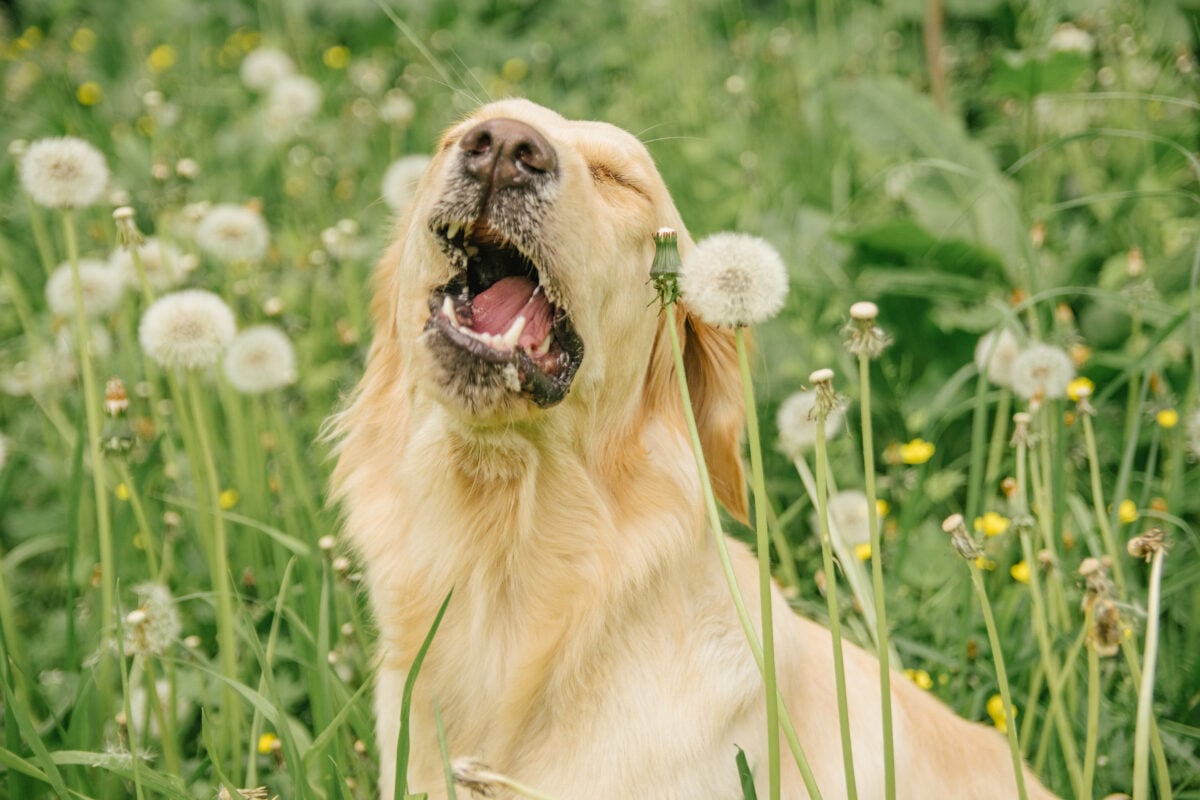
Allergic reactions often show up as sneezing, nasal discharge, red or itchy skin, paw licking, or ear irritation. Some pups have year-round sensitivities, while others only react during certain seasons.
Common triggers include:
- Pollen from trees, grasses, or weeds
- Dust or dander in the home
- Mold spores in damp environments
- Strong scents like air fresheners or cleaning products
- Fleas or certain food ingredients
If your dog sneezes more frequently during spring or after rolling in the grass, allergies may be the cause. Your vet can help pinpoint the trigger and recommend treatments like antihistamines, diet changes, or environmental adjustments.
Do Some Breeds Sneeze More Than Others?
Absolutely. Terriers, Retrievers, and Shepherds may be more sensitive to environmental allergens.
Flat-faced breeds like Pugs, Bulldogs, and Boston Terriers are more prone to reverse sneezing and other nasal issues.
And, small breeds like Chihuahuas and Toy Poodles often play sneeze with extra enthusiasm.
3. Irritants In The Air Or Around The Home
Dogs have incredibly sensitive noses, which means even everyday scents or particles can set off a sneezing fit. From dust bunnies to scented candles, plenty of household items can irritate their nasal passages.
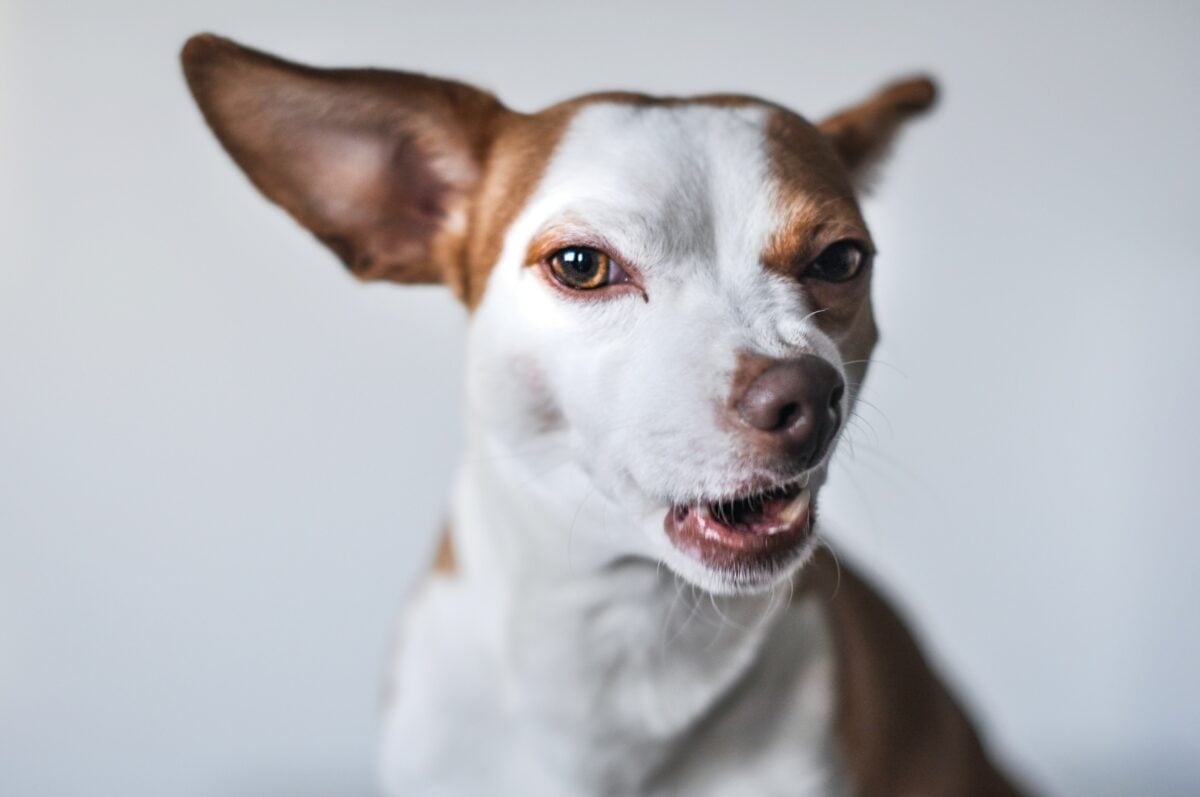
Common culprits include:
- Dust, dander, or cleaning sprays
- Scented candles and essential oils
- Smoke from fireplaces or cigarettes
- Perfumes, air fresheners, or chemical cleaners
Sometimes, sneezing happens during or after eating something irritating. Curious pups who nibble on drywall, coffee grounds, or paper products may accidentally breathe in fine particles.
If you suspect an irritant is to blame, try removing or minimizing the trigger. Switching to unscented products, running an air purifier, or dusting more frequently can make a big difference, especially for dogs with sensitive sniffers.
4. Something Stuck Up Their Nose (Foreign Body)
Dogs lead with their noses—literally. All that sniffing means it’s easy for something small to get lodged in a nostril.
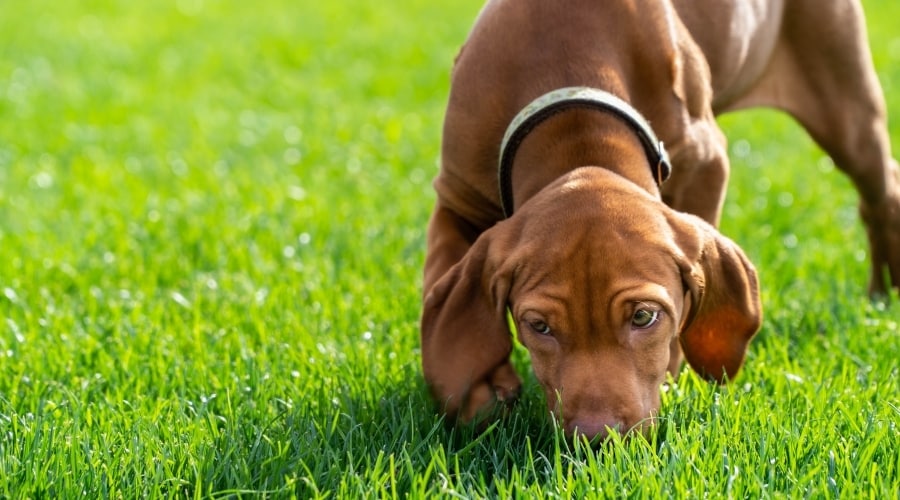
Blades of grass, dirt, seeds, or even tiny bugs can sneak their way in and cause nonstop sneezing.
Signs your dog may have something stuck in their nose include:
- Sudden, repeated sneezing
- Pawing at the face or nose
- Restlessness or frantic behavior
- Nosebleeds or discharge (in some cases)
If a foreign object is the cause, your dog probably won’t be able to ignore it. Don’t wait this one out—get to the vet. Sneezing can worsen irritation or even lead to injury if they’re aggressively pawing at their face.
One common culprit in certain regions? Foxtails—those sharp, barbed grass seeds that can easily lodge deep into a dog’s nasal passages. These often require sedation and specialized tools to remove.
5. Upper Respiratory Infection
Sneezing can be one of the first signs your dog is coming down with something. Upper respiratory infections are common in dogs, especially in high-exposure settings like shelters, boarding facilities, or busy dog parks.
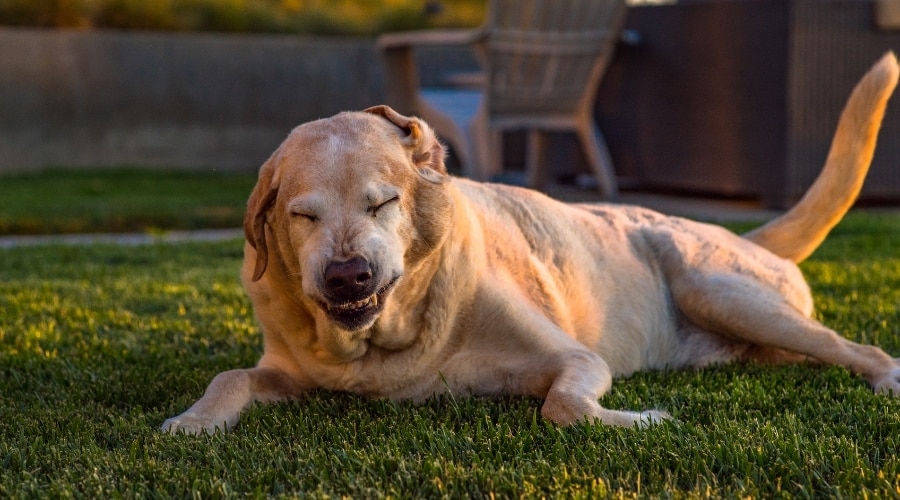
These infections spread quickly between dogs and are often caused by viruses or bacteria, like kennel cough, canine influenza, or adenovirus. While many cases are mild, they can still make your dog feel pretty miserable.
Watch for symptoms like:
- Frequent sneezing or coughing
- Nasal discharge
- Watery eyes
- Lethargy or reduced appetite
If your dog shows any of these signs—especially after contact with other dogs—check in with your vet. Early treatment can help prevent complications and reduce the risk of spreading it to others.
These infections are most often caused by Bordetella bronchiseptica (commonly known as kennel cough), canine influenza virus, or canine adenovirus. Most mild cases resolve in 7 to 14 days, but young puppies, senior dogs, or those with weakened immune systems are more vulnerable to complications like pneumonia.
6. A Hidden Tooth Problem
It might sound odd, but dental issues can cause sneezing, mainly if an infection has spread.
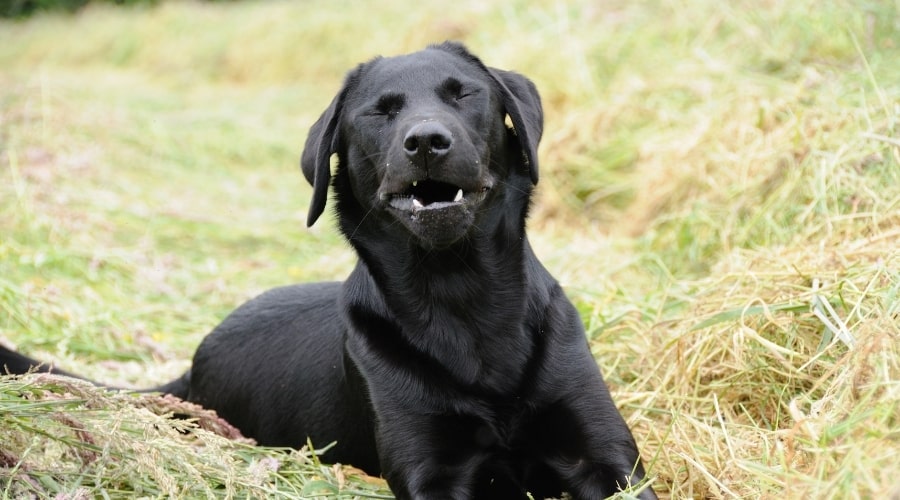
The roots of your dog’s upper teeth sit right next to their nasal passages. If one of those teeth becomes abscessed, the infection can break through and irritate the nose.
This usually happens in cases of severe dental disease, and it can lead to:
- Sneezing or nasal discharge
- Bad breath
- Swelling around the face or muzzle
- Sensitivity when eating or chewing
- Blood in the water bowl
If you notice a combination of sneezing and any of the symptoms above, don’t wait it out. A vet can confirm whether dental disease is to blame and recommend appropriate treatment, which may include antibiotics, x-rays, or even tooth extraction.
7. Nasal Mites (Yes, It’s A Thing)
Tiny mites can actually take up residence in your dog’s nose, and they’re just as unpleasant as they sound.
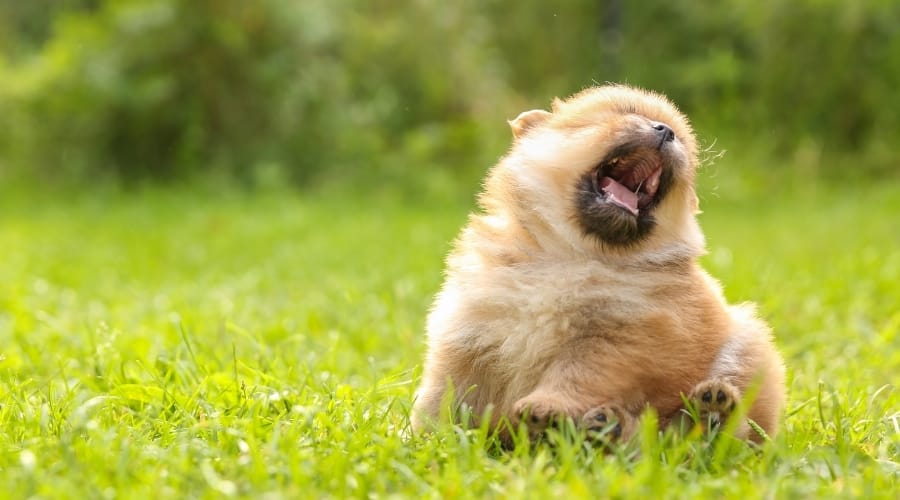
These microscopic parasites often hide in soil and can be picked up while digging, sniffing, or even through contact with another infected dog. Once inside, nasal mites can cause serious irritation.
Symptoms may include:
- Frequent sneezing
- Nasal discharge
- Head shaking or face pawing
- Noisy or labored breathing
- Restlessness or discomfort
Diagnosis usually requires a veterinary nasal exam, followed by a microscopic check to confirm the presence of mites. Thankfully, treatment is available, but you’ll need your vet’s help to get rid of them.
8. Nasal Tumor (Rare But Serious)
While nasal tumors are one of the less common causes of sneezing, they do happen, especially in older dogs. These cancerous growths develop inside the nasal cavity and can cause significant discomfort as they progress.

Symptoms may appear gradually and often include:
- Persistent sneezing
- Nasal discharge (sometimes bloody)
- Facial swelling or deformity
- Noisy breathing or coughing
- Loss of appetite or trouble eating
- Neurological symptoms in advanced cases
If your dog is showing any of these signs—especially in combination—it’s time to contact your vet.
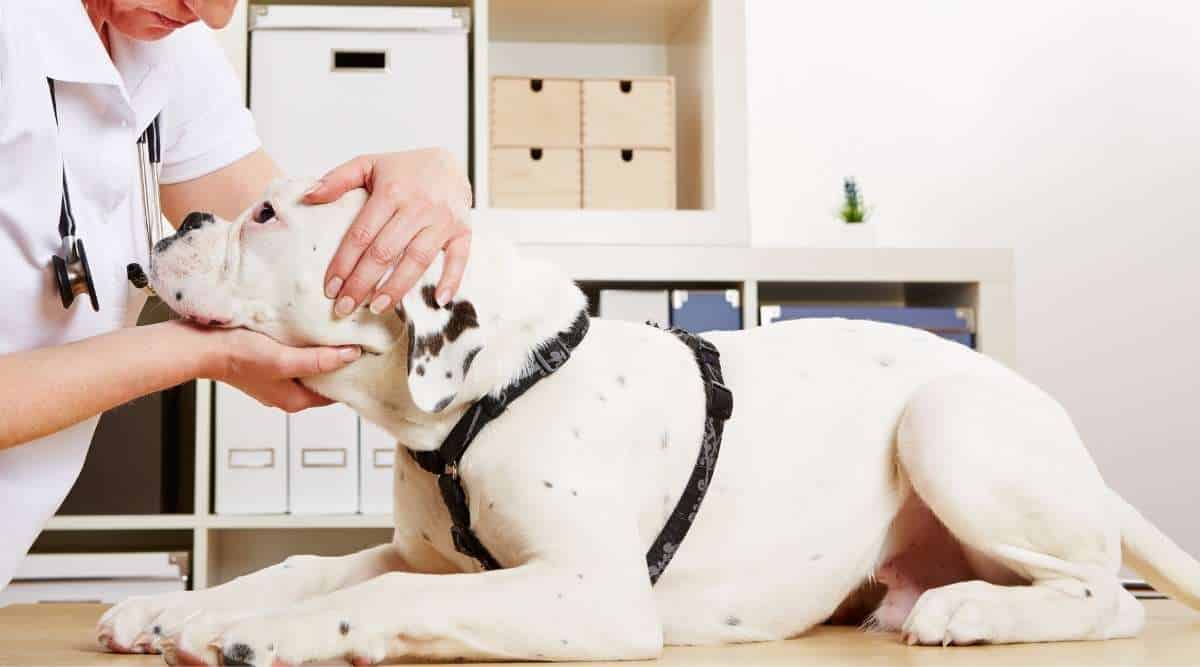
Early diagnosis is critical, and imaging tests like X-rays or CT scans are often needed to confirm the cause and plan treatment.
When To Worry About Dog Sneezing
Most sneezing is nothing to stress over. But sometimes, it’s your dog’s way of saying, “Hey, something’s not right.” Knowing when to call the vet can help you catch issues early and avoid bigger problems down the road.
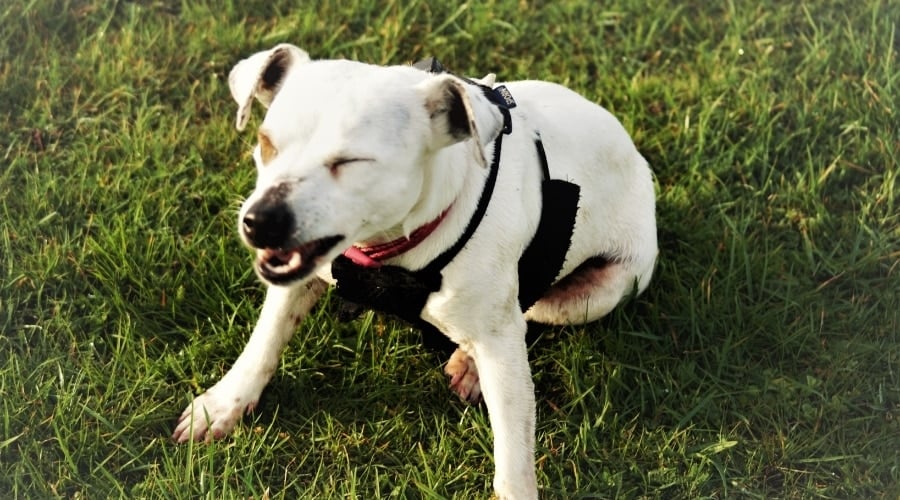
Contact your vet if sneezing is accompanied by:
- Blood or thick nasal discharge: This could signal a foreign object, infection, nasal mites, or in rare cases, a tumor.
- Swelling around the face or muzzle: Facial swelling is often linked to dental abscesses or sinus inflammation and should be examined quickly.
- Lethargy or appetite loss: These are general signs of illness and could point to an underlying infection or discomfort.
- Pawing at the face or signs of pain: If your dog can’t leave their face alone, something is bothering them—possibly something stuck in the nose or severe irritation.
- Breathing difficulties or coughing: These symptoms suggest a respiratory infection, reverse sneezing episode, or even fluid in the lungs.
If the sneezing seems sudden, intense, or just won’t let up, it’s always better to be safe and get it checked out, especially if your dog is acting differently than usual.
When in doubt, film the behavior and bring it to your vet. A quick video can help speed up the diagnosis.
Home Remedies For Sneezing Dogs
If your pup’s sneezing is mild and doesn’t include worrying symptoms, there are a few steps you can try at home to help relieve irritation. These methods may ease symptoms while you monitor for any escalation or prepare to consult your vet.
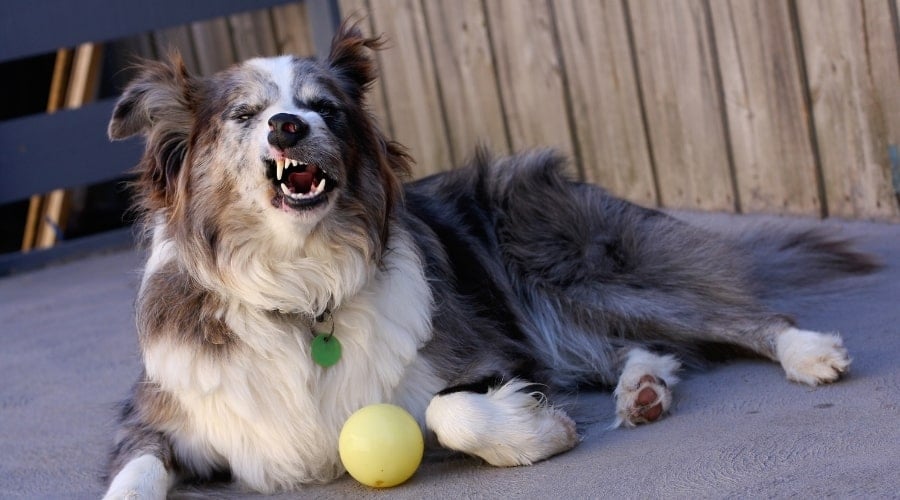
Try These Home Comfort Tips:
- Clean the air: Use unscented cleaning products and run an air purifier to reduce airborne irritants like dust or dander.
- Control indoor humidity: A cool-mist humidifier can keep your dog’s nasal passages from drying out and help reduce sneezing.
- Gentle saline rinse: A vet-approved saline spray (used briefly and carefully) can flush out trapped particles—never use harsh or medicated sprays without guidance.
- Wash bedding frequently: Clean your dog’s bedding and toys regularly to eliminate allergens and odor-causing particles.
Want more home remedies, including diet tips, herbs, and supplements? Check out our complete guide: Home Remedies for Sneezing Dog.
Sneezing, Snorting, Or Something Else?
Not all odd nose sounds are sneezes. Here’s how to tell them apart:
| Behavior | What It Looks/Sounds Like | What It Might Mean |
|---|---|---|
| Regular Sneezing | Sharp exhale, multiple in a row | Allergies, irritants, excitement |
| Reverse Sneezing | Inhale-snorting, body stiffens | Usually harmless, brief episodes |
| Snorting | Short, harsh nose sounds | Common in brachycephalic breeds |
| Coughing/Gagging | Deeper, chesty or throat-driven | Respiratory or GI issue |
Frequently Asked Questions
Sneezing might seem simple, but it can mean different things depending on your dog’s age, environment, and overall health. Below are some of the most common questions dog parents ask about sneezing.
Don’t see your question? Ask us in the comments!
Why Is My Dog Sneezing So Much All Of A Sudden?
Sudden, frequent sneezing could be caused by something stuck in your dog’s nose, a new irritant in the environment, or the start of a respiratory infection. If it doesn’t resolve within a day or is paired with other symptoms like discharge or face rubbing, it’s best to consult your vet.
Can I Give My Dog Benadryl For Sneezing?
In some cases, yes, but only with guidance from your vet.
Benadryl (diphenhydramine) can help with allergy-related sneezing, but the dosage must be exact. Some formulations contain ingredients that are toxic to dogs, especially those with other health conditions.
Always check with your vet before giving any over-the-counter medication.
Can Dogs Sneeze From Anxiety Or Excitement?
Yes, some dogs sneeze when they’re excited or overstimulated. This is especially common during play or in social settings. It’s often harmless and part of your dog’s body language.
Can Dogs Sneeze From Strong Smells Or Perfume?
Yes, many dogs are sensitive to strong fragrances like air fresheners, scented candles, essential oils, and even perfume. These smells can irritate the sensitive lining of your dog’s nose and cause sneezing, snorting, or reverse sneezing episodes.
Try switching to unscented products if you notice a pattern.
Should I Be Worried If My Dog Sneezes Every Day?
If your dog sneezes once or twice a day with no other symptoms, it’s usually not a concern. But daily sneezing with nasal discharge, irritation, or behavioral changes could point to allergies, mites, or other issues that a vet should evaluate.
Why Does My Puppy Keep Sneezing?
Puppies sneeze for many of the same reasons adult dogs do—play, dust, or mild irritants. But they’re also more vulnerable to infections due to their developing immune systems.
If your puppy is sneezing frequently, monitor for other signs like discharge, coughing, or low energy. It could be something simple, like playtime excitement, or something more serious, like an upper respiratory infection that needs prompt treatment.
Can Sneezing Be A Sign Of Something Serious In Dogs?
Yes, though most sneezing is harmless, it can occasionally point to more serious health issues. Conditions like nasal tumors, dental abscesses, or chronic infections may start with frequent sneezing and gradually develop additional symptoms like facial swelling, nosebleeds, or appetite loss.
If your dog’s sneezing seems intense, unusual, or doesn’t improve, it’s best to have your vet rule out anything serious early on.
Can A Tooth Infection Really Make A Dog Sneeze?
Yes. Infections in a dog’s upper teeth can affect the nasal cavity and cause sneezing. This is more likely in cases of advanced dental disease and may be accompanied by bad breath, swelling, or pain while eating.
How Do Vets Figure Out Why My Dog Is Sneezing?
Your vet will start with a physical exam and a history of your dog’s symptoms. If sneezing is severe or persistent, they may recommend additional tests like:
- Nasal swabs or cultures
- Dental x-rays to check for hidden infections
- Rhinoscopy, where a small camera is used to look inside the nasal cavity
- Allergy testing or bloodwork
These tools help pinpoint the exact cause and rule out more serious issues.
Is It Normal For Dogs To Sneeze When They Play?
Absolutely. Play sneezing is a typical social behavior that signals excitement and friendliness. It’s especially noticeable in small or expressive breeds and doesn’t require treatment.
Help Your Dog Breathe Easy
Preventing sneezing starts with knowing your dog’s triggers. Pay attention to seasonal patterns, household habits, and playtime behavior. A few small changes—like switching to fragrance-free cleaners or brushing your dog’s teeth more often—can make a big difference.
Want to help your dog feel better at home? Start with these home remedies for sneezing dogs. You can also explore allergy supplements for dogs or upgrade your pup’s oral care with the best dog toothbrushes. And when in doubt, don’t hesitate to call your vet. Your dog’s nose will thank you.
